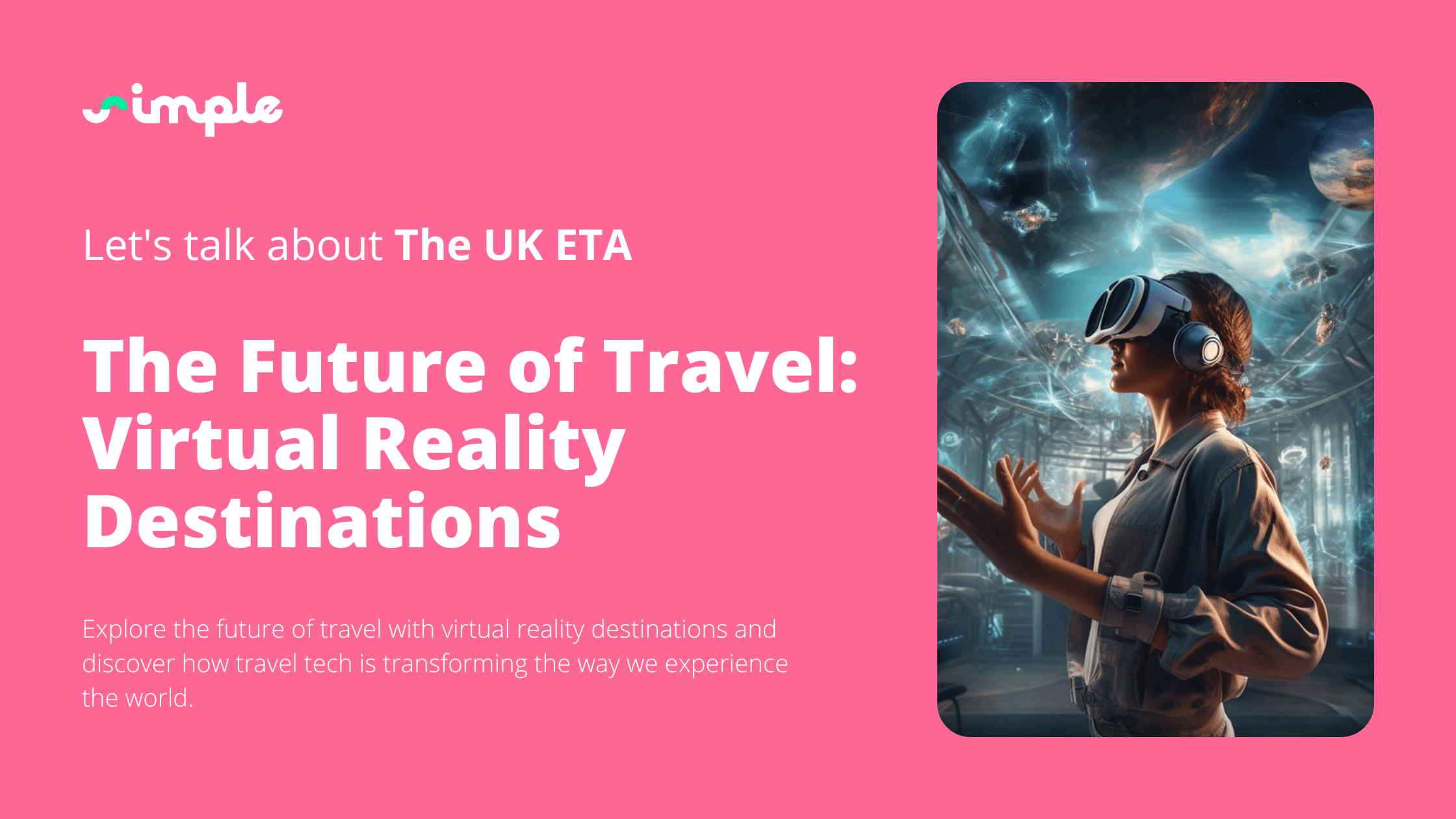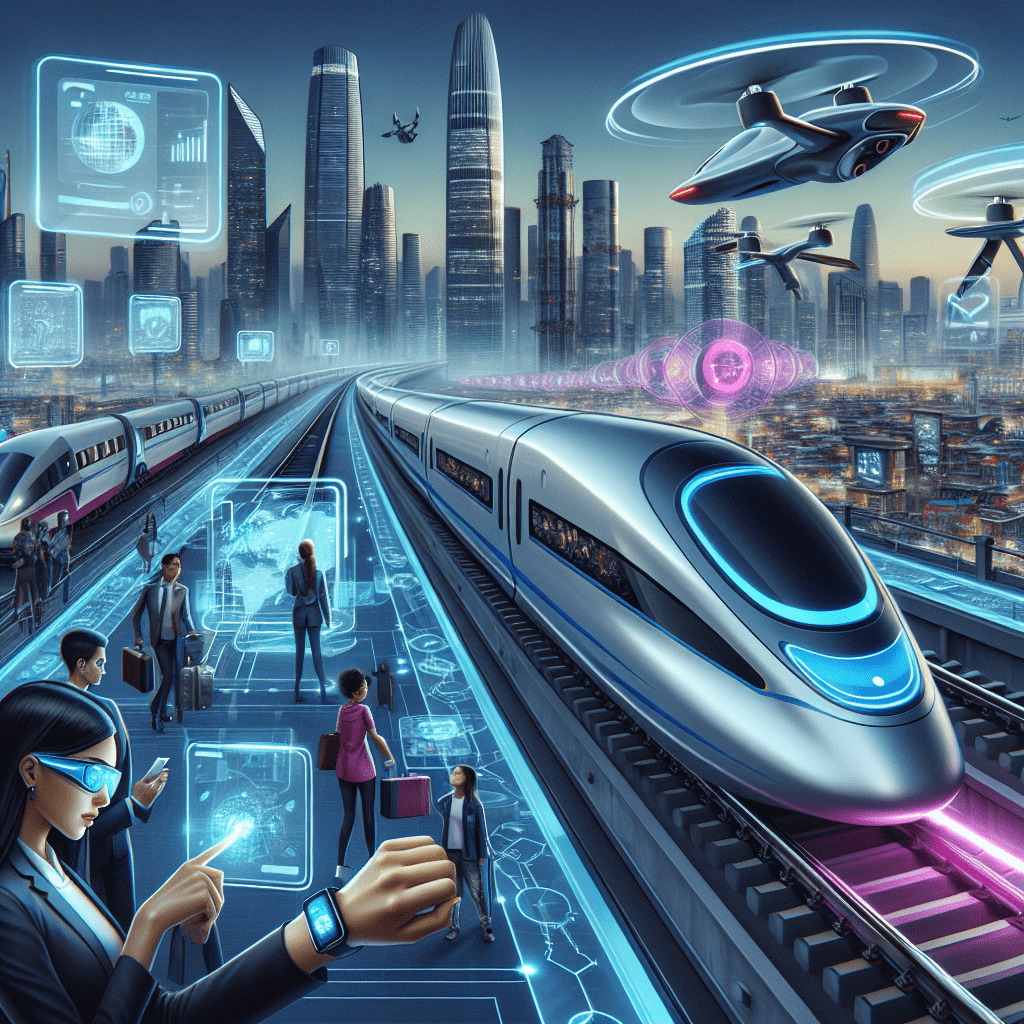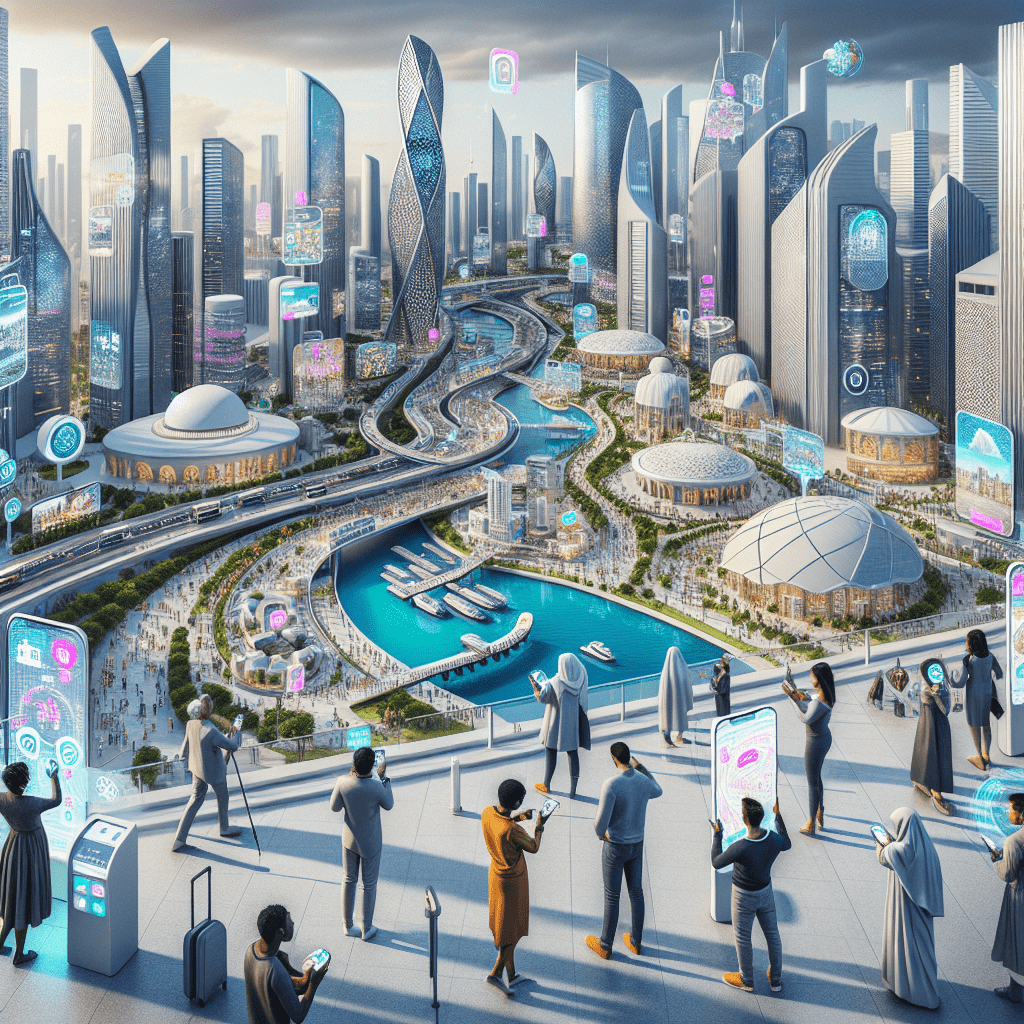The Future of Travel: Virtual Reality Destinations

The travel industry has witnessed a remarkable transformation over the past few decades, driven by the rapid evolution of travel technology. From the advent of online travel platforms to the rise of mobile travel apps, technology has continually reshaped how we explore the world. As we stand on the brink of a new era, virtual reality (VR) emerges as a groundbreaking force poised to redefine travel experiences. By offering immersive and interactive environments, VR destinations promise to revolutionize the way we perceive and engage with the world around us.
Virtual reality in travel is not just a futuristic concept; it is a tangible reality that is already making waves in the industry. By simulating real-world locations and experiences, VR allows users to explore destinations from the comfort of their homes. This innovation holds the potential to make travel more accessible and inclusive, breaking down physical and financial barriers. However, as with any technological advancement, VR destinations come with their own set of challenges and considerations. From technological limitations to ethical concerns, the journey towards fully realizing the potential of VR in travel is both exciting and complex.
As we delve deeper into the possibilities of virtual reality destinations, it is essential to understand the broader context of travel tech and its impact on the industry. By examining the benefits, challenges, and future prospects of VR in travel, we can better appreciate the transformative potential of this innovative technology.

The Rise of Virtual Reality in Travel
Historical Context of VR Technology Development
Virtual reality technology has a rich history that dates back several decades, with its roots in early innovations that laid the groundwork for today’s advancements. The concept of VR began to take shape in the mid-20th century, with the development of the first head-mounted displays and immersive simulators. These early innovations, though rudimentary by today’s standards, set the stage for the evolution of VR as a transformative tool in various industries, including travel.
In recent years, significant advancements have made VR more accessible and practical for mainstream use. The introduction of affordable VR headsets and the proliferation of high-speed internet have democratized access to virtual experiences. This technological progress has enabled the creation of more sophisticated and realistic virtual environments, allowing users to explore destinations in ways that were previously unimaginable. As a result, VR has become an integral part of digital travel solutions, offering new possibilities for both travelers and the travel industry.
Current Applications of VR in the Travel Industry
Today, virtual reality is being harnessed in various ways to enhance the travel experience. One of the most popular applications is virtual tours, which provide users with immersive experiences of destinations around the globe. These virtual travel experiences allow potential travelers to explore landmarks, hotels, and attractions in a 360-degree environment, offering a taste of what awaits them in the real world. This not only aids in travel planning but also helps in making informed decisions about destinations and accommodations.
Beyond virtual tours, VR is also being used to enhance travel planning and decision-making processes. By integrating VR with online travel platforms and travel booking software, users can visualize their entire trip, from flights to accommodations, before making any commitments. This integration of smart tourism technology ensures that travelers have a comprehensive understanding of their journey, leading to more satisfying travel experiences. Additionally, VR is being used in conjunction with augmented reality travel applications to provide real-time information and interactive experiences at destinations, further enriching the travel experience.
Key Players and Innovators in VR Travel Technology
The rise of VR in travel has been driven by a combination of established companies and innovative startups. Major tech companies have invested heavily in VR technology, developing platforms and devices that cater to the travel industry. These companies are at the forefront of travel industry innovation, creating tech-driven travel services that redefine how we explore the world.
In addition to these tech giants, numerous startups are making significant contributions to the VR travel landscape. These companies are developing niche solutions that cater to specific aspects of the travel experience, from virtual reality travel guides to immersive cultural experiences. Collaborations between tech companies and travel industry stakeholders are also playing a crucial role in advancing VR travel technology. By working together, these entities are creating comprehensive travel management systems that integrate VR with other emerging technologies, such as AI in the travel industry and travel data analytics, to offer seamless and personalized travel experiences.

Benefits of Virtual Reality Destinations
Accessibility and Inclusivity in Travel Experiences
Virtual reality destinations offer unprecedented accessibility and inclusivity, breaking down traditional barriers that have long limited travel opportunities for many individuals. One of the most significant advantages of VR is its ability to overcome physical and financial constraints. For individuals with mobility challenges or those who cannot afford the costs associated with traditional travel, VR provides a viable alternative. By simulating real-world environments, VR allows users to explore destinations without the need for physical travel, making it an essential component of digital travel solutions.
Moreover, VR opens up travel experiences to a diverse audience, including those who may not have considered travel due to various limitations. With the integration of smart tourism technology, VR can cater to different needs and preferences, offering personalized experiences that resonate with users from all walks of life. This inclusivity is further enhanced by the use of mobile travel apps and online travel platforms, which make VR experiences easily accessible to anyone with a smartphone or VR headset. As a result, VR is not only democratizing travel but also fostering a more inclusive and diverse travel community.
Environmental and Sustainability Advantages
In an era where environmental concerns are at the forefront of global discussions, virtual reality destinations offer a sustainable alternative to traditional travel. By reducing the need for physical travel, VR significantly lowers the carbon footprint associated with transportation and resource consumption. This shift towards more sustainable travel practices aligns with current travel technology trends that prioritize environmental responsibility and conservation.
VR also plays a crucial role in promoting awareness of conservation efforts and environmental issues. Through immersive virtual travel experiences, users can explore natural wonders and endangered ecosystems without causing harm or disruption. This not only educates users about the importance of conservation but also inspires them to support and engage in sustainable practices. As part of a broader strategy that includes travel automation tools and travel data analytics, VR is helping to create a more sustainable and environmentally conscious travel industry.
Enhancing Cultural Understanding and Education
One of the most profound benefits of virtual reality destinations is their ability to enhance cultural understanding and education. By offering authentic and immersive cultural experiences, VR allows users to engage with different cultures in a meaningful way. This is particularly valuable in a globalized world where cultural exchange and understanding are essential for fostering empathy and cooperation.
Through VR, users can participate in virtual tours of historical sites, attend cultural festivals, and interact with local communities, all from the comfort of their homes. This immersive approach to cultural education is further supported by augmented reality travel applications, which provide real-time information and context to enhance the learning experience. By facilitating global learning and empathy, VR is not only enriching individual travel experiences but also contributing to a more interconnected and harmonious world.

Challenges and Considerations
Technological Limitations and User Experience
While virtual reality destinations offer exciting possibilities, they also come with technological limitations that can impact user experience. One of the primary challenges is the hardware and software constraints that currently exist. High-quality VR experiences require advanced hardware, such as VR headsets and powerful computing systems, which can be cost-prohibitive for some users. Additionally, the development of sophisticated software that can create realistic and immersive environments is a complex and resource-intensive process.
Ensuring realistic and engaging experiences is crucial for the success of VR in travel. Users expect seamless and lifelike interactions within virtual environments, which requires continuous advancements in VR technology. As part of the broader landscape of travel industry innovation, developers are working to overcome these challenges by integrating AI in the travel industry and leveraging travel data analytics to enhance user experiences. Despite these efforts, achieving the perfect balance between realism and accessibility remains an ongoing challenge for the industry.
Ethical and Privacy Concerns
As with any digital travel solution, virtual reality destinations raise important ethical and privacy concerns. Data security and user privacy are paramount, as VR experiences often require the collection and processing of personal information. Ensuring that this data is protected and used responsibly is a critical consideration for developers and service providers. The integration of travel management systems and travel automation tools must prioritize user privacy to maintain trust and confidence in VR technology.
Another ethical consideration is the balance between virtual and real-world experiences. While VR offers unique opportunities for exploration and learning, it is essential to ensure that these experiences do not replace or diminish the value of real-world travel. Augmented reality travel applications can help bridge this gap by enhancing real-world experiences with digital information and interactions. As the industry continues to evolve, finding the right balance between virtual and physical travel will be crucial for maintaining the integrity and authenticity of travel experiences.
Future Prospects and Potential Developments
The future of virtual reality in travel is filled with exciting prospects and potential developments. Innovations on the horizon include advancements in VR hardware, such as more affordable and lightweight headsets, as well as improvements in software that enable more realistic and interactive environments. These developments are expected to drive the adoption of VR as a mainstream travel technology trend, making it an integral part of tech-driven travel services.
As VR continues to evolve, its role in shaping the future of travel will become increasingly significant. The integration of Internet of Things travel technologies and AI in the travel industry will further enhance the capabilities of VR, enabling more personalized and dynamic travel experiences. By leveraging these technologies, VR has the potential to transform the way we explore the world, offering new opportunities for discovery and connection. As the industry embraces these innovations, virtual reality destinations will play a pivotal role in defining the future of travel.
Embrace the Future of Travel with Simplevisa
Apply for your visa online and explore the world
Virtual reality is shaping the future of travel, offering immersive and interactive experiences that redefine how we explore the world. With VR, travelers can visit destinations from the comfort of their own homes, making travel more accessible and inclusive. Simplevisa harnesses the power of digital solutions to simplify your visa application process, so you can focus on planning your next adventure. Visit simplevisa.net to apply for your visa online—no need for an app! Let us take care of the paperwork while you dream about the possibilities in virtual and real-world travel.
Conclusion

The transformative potential of virtual reality in travel is undeniable. As we have explored, VR offers a revolutionary approach to experiencing the world, breaking down barriers and creating new opportunities for exploration and understanding. By providing immersive and interactive environments, VR destinations allow users to engage with places and cultures in ways that were previously unimaginable. This technology not only enhances accessibility and inclusivity but also promotes sustainability and cultural education, aligning with the broader goals of the travel industry. As digital travel solutions continue to evolve, VR stands out as a key player in shaping the future of travel, offering a glimpse into a world where technology and exploration go hand in hand.
Encouraging continued exploration and innovation in VR destinations is essential for realizing the full potential of this technology. As the industry progresses, it is crucial to address the challenges and considerations that come with VR, from technological limitations to ethical concerns. By fostering collaboration between tech companies, travel industry stakeholders, and innovators, we can overcome these obstacles and unlock new possibilities for VR in travel. The integration of smart tourism technology, travel automation tools, and AI in the travel industry will further enhance the capabilities of VR, paving the way for more personalized and dynamic travel experiences. As we look to the future, the continued development and adoption of VR will play a pivotal role in redefining how we explore and connect with the world, offering endless opportunities for discovery and growth.